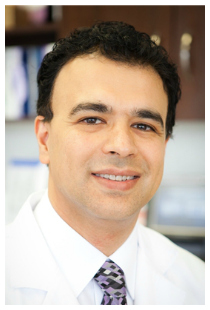
Dr. Reza Ghohestani, MD
Physician
Dermatology
Medical Expertise of Dr. Reza Ghohestani, MD
Medical and cosmetic dermatology
About Dr. Reza Ghohestani, MD
Reza F. Ghohestani, M.D, Ph.D.specializes in skin, hair & nail diseases as well as in Cosmetic Dermatology & Derm Surgery. He is among the few dermatologists in the San Antonio & Boerne area who has spent over a decade as a principal investigator in basic & clinical dermatology research. Dr. Ghohestani completed his internship in surgery at Pennsylvania Hospital, the Nation’s first hospital; one of the top 100 hospitals in U.S. He then did a residency in dermatology at Thomas Jefferson Univ, one of the top dermatology programs in the country.Dr. Ghohestani obtained a master’s degree in Cutaneous Biology, Cosmetology, & Skin Pharmacology, & a Ph.D. in Skin Immunobiology from Claude Bernard Univ. , one of the top French Univ. He was mentored by Pr. Jean Thivolet, Alan Claudy, & Jean Francois Nicolas. Dr. Ghohestani did a fellowship at the Nice School of Medicine & was mentored by Pr. Jean-Paul Ortonne & Gim Meneguzzi. Dr. Ghohestani served as the principal investigator & team leader for many years at various Academic Institutes. His research was funded by the NIH, the Dermatology Foundation, the American Skin Association, among others. Dr. Ghohestani was on Faculty as an Assistant & then Associate Professor, Thomas Jefferson Univ. (1998 – 2007) before moving to San Antonio. Dr. Ghohestani is a former Chief & Associate Professor of Dermatology & Cutaneous Surgery at UT Health, San Antonio. Dr. Ghohestani’s outstanding work & dedication to excellence have earned him numerous honors & peer recognitions including the American Skin Association Career Award, the Dermatology Foundation Career Award, the Charles Grupper Prize by the French Society of Dermatology, the Stelwagon Award for Best Publication by the College of Physicians of Philadelphia & the Commitment to Professionalism award by the Pennsylvania Medical Society. Dr. Ghohestani is skilled in the art & science of skin care, dermatology & surgery. He continually searches for & implements the best treatment options for patients. He also served as the co-editor of the European Journal of Dermatology. He speaks frequently to a variety of public & professional organizations. His outstanding works have been presented in more than 100 national & international meetings. He has received several national & international awards & fellowships including: Rene TOURAINE Foundation for Dermatological Research Fellowship, St. Louis Hospital, Paris, Charles GRUPPER-French Society of Dermatology 1st Prize in Dermatological Research, Paris, , Kharazmi International Research Prize in Medical Research, French Foundation for Medical Research Fellowship (Fondation pour la Recherche Medicale), Paris, International League of Dermatological Societies, Sydney, Australia, French Foundation (Fondation de France) Award, Paris; European Academy of Dermatology & Venereology/Yamanouchi Research Fellowship Award, Dublin; Research Scientist Career Development Award, American Skin Association, New York; Robert Degos Award for Best Publication in Dermatology Research, French Society of Dermatology, Paris, American Association of Immunologists Junior Faculty Award. Stelwagon Award for Best Publication in Dermatology Research, College of Physicians of Philadelphia, Johnson Award for Dermatology Research, College of Physicians of Philadelphia, Commitment to Professional Competence, Pennsylvania Medical Society, Hershey. Physician-Scientist Career Award, Dermatology Foundation, San Francisco, CA. Johnson-Beerman Award, College of Physicians of Philadelphia
Patient Education Resources
Can I switch the biologic medications I’m using to treat my psoriasis?
Yes, you can switch biologic medications for psoriasis if one is not working effectively. Biologic medications are a class of drugs that target specific parts of the immune system that are involved in...
Yes, you can switch biologic medications for psoriasis if one is not working effectively. Biologic medications are a class of drugs that target specific parts of the immune system that are involved in...
Does Coolsculpting® really work?
CoolSculpting® is a non-surgical, non-invasive procedure that uses a device to cool targeted areas of fat, causing the fat cells to freeze and die. Over time, the body naturally eliminates these d...
CoolSculpting® is a non-surgical, non-invasive procedure that uses a device to cool targeted areas of fat, causing the fat cells to freeze and die. Over time, the body naturally eliminates these d...
How do biologics work to treat my eczema?
Biologics are a class of medications that can be used to treat eczema, a chronic skin condition characterized by inflammation and itching. Biologics work by targeting specific parts of the immune syst...
Biologics are a class of medications that can be used to treat eczema, a chronic skin condition characterized by inflammation and itching. Biologics work by targeting specific parts of the immune syst...
How long does it take for a tattoo to disappear after laser tattoo removed?
The length of time it takes to remove a tattoo depends on several factors, including the size, location, and color of the tattoo, as well as the individual's skin type and overall health.The most ...
The length of time it takes to remove a tattoo depends on several factors, including the size, location, and color of the tattoo, as well as the individual's skin type and overall health.The most ...
What are the possible treatments for my actinic keratoses?
Actinic keratoses (AKs) are precancerous skin lesions that can develop into squamous cell carcinoma, a type of skin cancer. Treatment options for AKs include:Cryotherapy: This procedure involves freez...
Actinic keratoses (AKs) are precancerous skin lesions that can develop into squamous cell carcinoma, a type of skin cancer. Treatment options for AKs include:Cryotherapy: This procedure involves freez...
Texas Institute of Dermatology, Laser & Cosmetic Surgery
